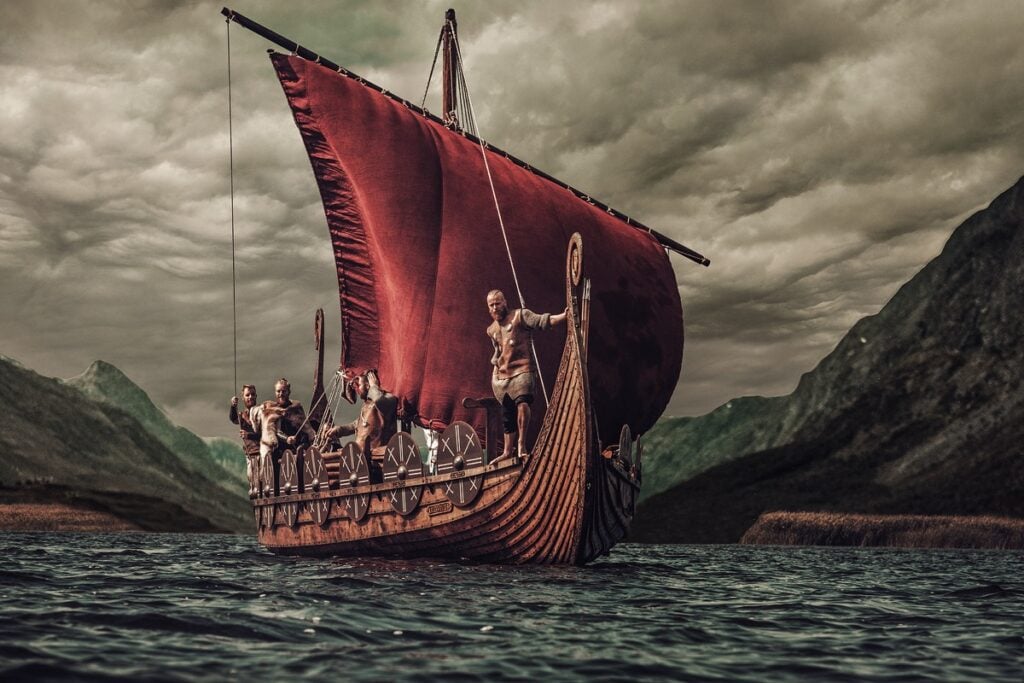10 Viking Funeral Prayers and Their Interpretations
Viking funerals evoke a sense of reverence, bravery, and the deep spirituality of Norse culture. Rooted in mythology, these prayers are not only poetic but also serve as a guide for honoring the departed. Below are 10 Viking funeral prayers, paired with interpretations to understand their significance.
Farewell to the Warrior
Prayer:
“Farewell, brave soul, who sailed life’s stormy seas.
May Odin guide your ship to Valhalla’s halls,
Where swords gleam bright, and songs of victory echo.
We raise our horns to honor your name forever.”
Interpretation: This prayer is a tribute to the courage of the deceased, envisioning them as a warrior who has braved life’s challenges. Odin’s guidance signifies the ultimate honor of reaching Valhalla, the hall of the fallen, where heroes feast eternally. It reflects communal respect and remembrance.
Journey to Valhalla
Prayer:
“Ride the winds, fearless one,
To where the Allfather waits.
In Valhalla’s mead-filled halls,
Feast and glory shall be yours eternal.”
Interpretation: This prayer emphasizes the journey of the soul to Valhalla. The “winds” symbolize the natural forces guiding the deceased, while “mead-filled halls” highlight the rewards awaiting those who lived honorably and bravely.
Prayer to the Gods
Prayer:
“Thor, grant strength to the one who falls.
Freya, embrace them in your arms.
Odin, lead them to the wisdom of the beyond.
May the gods honor their deeds and bravery.”
Interpretation: This prayer calls upon three key Norse deities. Thor represents protection and strength, Freya symbolizes love and afterlife, and Odin embodies wisdom and valor. It’s a multifaceted appeal ensuring the departed is cared for in every aspect of their journey.
Invocation for the Sea-Farer
Prayer:
“Skadi, calm the waves beneath their ship.
Njord, carry them swiftly across the seas.
Let the winds sing their deeds,
And the waters carry their memory forever.”
Interpretation: Vikings were seafarers, and this prayer reflects their connection to the sea. Skadi and Njord, deities of the mountains and seas respectively, are invoked to ensure a smooth passage. It’s a metaphor for the soul’s transition to the afterlife.
Light of the Pyre
Prayer:
“With flame and ash, we send you home.
The fire carries your soul to the stars.
May your light guide us always,
And your spirit watch over us from the heavens.”
Interpretation: This prayer highlights the symbolic role of fire in Viking funerals, often associated with cremation. The imagery of fire transforming the soul into a celestial presence represents eternal guidance and protection.
The Saga Continues
Prayer:
“Your story does not end here.
It becomes a thread in the great tapestry,
Woven by the Norns under Yggdrasil’s roots.
We will tell your tale for generations.”
Interpretation: Norse mythology views life as part of a larger tapestry woven by the Norns (fate-weaving deities). This prayer reassures that the deceased’s legacy will endure, connecting them to the eternal cycle of existence.
Honor to the Ancestors
Prayer:
“Ancestor of our line,
May your strength live on in us.
Guide our swords, steady our hearts,
And stand with us in every storm.”
Interpretation: This prayer honors the deceased as a guiding force for their descendants. It reflects the Viking emphasis on ancestry and continuity, emphasizing the spiritual connection between the living and the dead.
Shield Wall Eternal
Prayer:
“May your shield wall stand unbroken in the afterlife.
May your sword never dull,
And your victories be sung by Skalds forevermore.
Rest now, mighty one, until we meet again.”
Interpretation: The shield wall, a formation symbolizing unity and protection, represents eternal solidarity. The skalds (poets) singing their deeds signify immortality through storytelling.
Call to Freya
Prayer:
“Freya, guide this soul to the next journey.
May they find peace in your fields,
And the beauty of Folkvangr surround them.
Hail to you, Queen of the Valkyries.”
Interpretation: Freya, as the goddess of love and death, is invoked to guide the soul to Folkvangr, a realm for the honored dead. This prayer celebrates Freya’s nurturing and protective aspects, ensuring a peaceful afterlife.
A Warrior’s Rest
Prayer:
“Sleep now, fearless heart,
Your battles are done, your wars are won.
In the Halls of the Brave, your seat awaits,
With mead in your hand and eternity before you.”
Interpretation: This prayer offers closure by acknowledging the end of earthly struggles. The “Halls of the Brave” symbolize Valhalla, where eternal reward and camaraderie await those who lived with valor.
Notes on Viking Funeral Prayers
These prayers reflect themes of bravery, honor, and continuity. They often involve:
- Mythological Context: Invoking gods like Odin, Freya, and Thor connects the deceased to the spiritual world. These deities not only guide the soul but also embody values of strength, wisdom, and love, which were central to Viking life and beliefs.
- Connection to Nature: References to the sea, fire, and wind mirror the Vikings’ deep respect for natural elements. The integration of these forces signifies the harmony between human life and the environment, emphasizing the role of nature in the journey to the afterlife.
- Storytelling: The emphasis on legacy and skaldic songs highlights the Viking tradition of preserving memory through tales. By ensuring the deceased’s deeds are remembered, these prayers honor the cultural importance of oral history and communal identity.
- Journey and Transition: Many prayers frame death as a voyage, echoing Viking seafaring culture. This metaphor not only reflects their practical life but also symbolizes the spiritual passage to realms like Valhalla or Folkvangr, reinforcing the belief in an active, ongoing existence after death.
- Ancestral Connection: Vikings placed great importance on ancestry and lineage. Prayers that invoke ancestors acknowledge the deceased’s place in the unbroken chain of family, ensuring that their spirit lives on as a source of guidance and strength.
Viking funeral prayers resonate not only as tributes but as timeless reflections on life, death, and the eternal human spirit.

